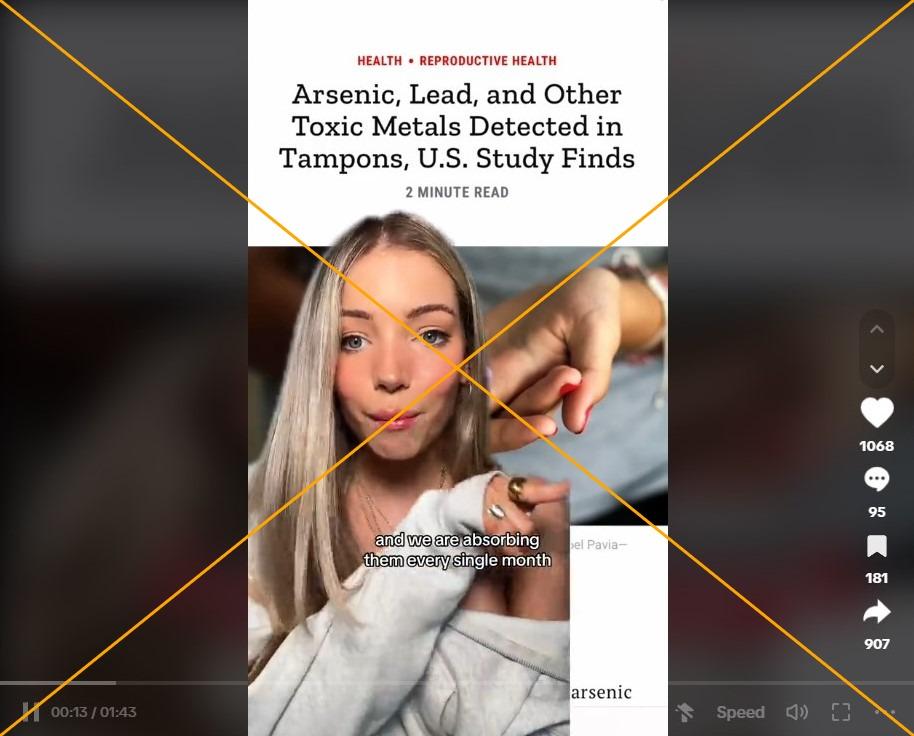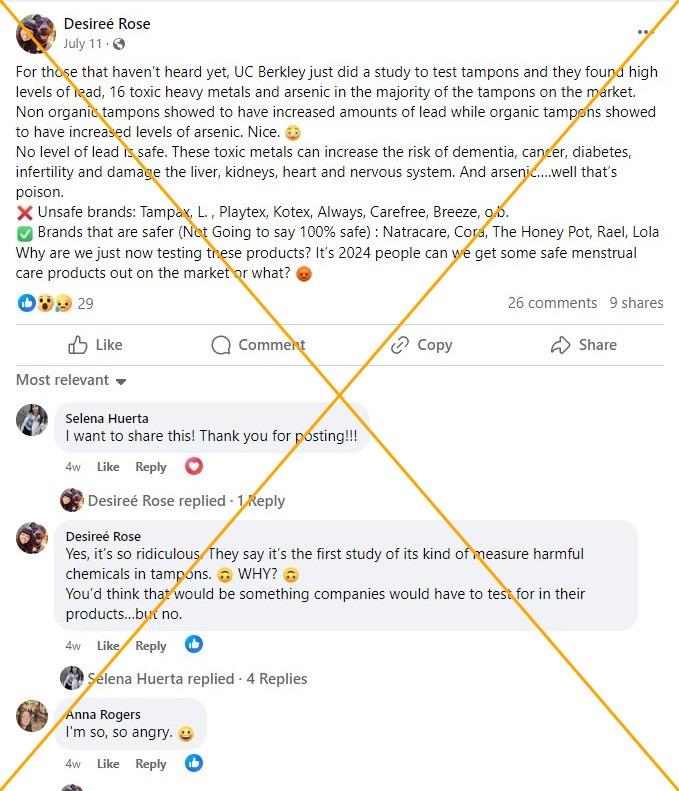
Study did not prove tampons cause health problems
"Arsenic and lead, two of the most toxic substances that we can be putting into our body, are literally inside of our tampons and we are absorbing them every single month," a TikTok user claims in a July 9, 2024 video.
Viewed more than 45,000 times, the TikTok goes on to claim: "These chemicals and metals have literally been shown to cause endometriosis, cancer, infertility."


Similar claims are circulating on Facebook, X and Threads.
The posts are referencing the study "Tampons as a source of exposure to metal(loid)s" (archived here) and its findings of 16 different metals -- including lead, arsenic and cadmium -- in products tested from 14 different brands. The study did not determine if the body absorbs the metals.
"It's unclear if the metals detected by this study are contributing to any negative health effects," a press release from the University of California, Berkeley,- where the research was led, said (archived here).
Nathaniel DeNicola, obstetrician and gynecologist and chief medical officer for Caduceus Medical Group (archived here) said the study shows a need for more research. "You really can't say at all what is being absorbed with tampons," he said.
He said any absorption of the chemicals found in popular tampon brands -- especially lead -- is not safe. However, he said he would not "tell women they should not use tampons based on this."
DeNicola said: "If you're looking at social media claims as the reason you say that tampons have been proven to put lead in your system and therefore cause health problems; that's just not proven."
He did point to links between tampon use and the potential for bacterial infections, saying patients should be aware of the rare risk of toxic shock syndrome (archived here).
Jeanne Conry, an obstetrician and gynecologist and founder of the Environmental Health Leadership Foundation (archived here), also said that although the research cited online did not establish a cause and effect between tampons and health issues, heavy metals could have an impact.
"We should expect that personal care products -- whether they are tampons or face creams -- should not carry potentially toxic chemicals," Conry said.
She said research into products already on the market is difficult and investigating this topic is further complicated by how to limit the exposure to additional substances that can disrupt reproductive health.
Metals such as arsenic and lead, while toxic, are naturally occurring in the Earth and traces of these substances can be found in many products including food and cosmetics. The US Food and Drug Administration (FDA) monitors these products to determine if they pose health risks.
Jen Gunter, an obstetrician and gynecologist based in Canada, said in a blog post the trace amounts cited in the study did not appear to pose risks when compared with other products, noting that "green tea and black tea have more arsenic than a super tampon."
Tampons are regulated
The FDA does regulate tampons as medical devices (archived here). The agency recommends manufacturers inform consumers of any chemicals or chemical residues present in the tampon and identify the bleaching process used on the product. It also suggests the product be free of dioxin -- an environmental pollutant -- pesticide and herbicide residues (archived here).
FDA press officer Amanda Hils said the administration is reviewing the study and will "take any action warranted to safeguard the health of consumers who use these products."
Hils also said: "Adverse events with tampons are rare."
AFP has fact-checked other misleading claims about tampons here.
Copyright © AFP 2017-2026. Any commercial use of this content requires a subscription. Click here to find out more.
Is there content that you would like AFP to fact-check? Get in touch.
Contact us
